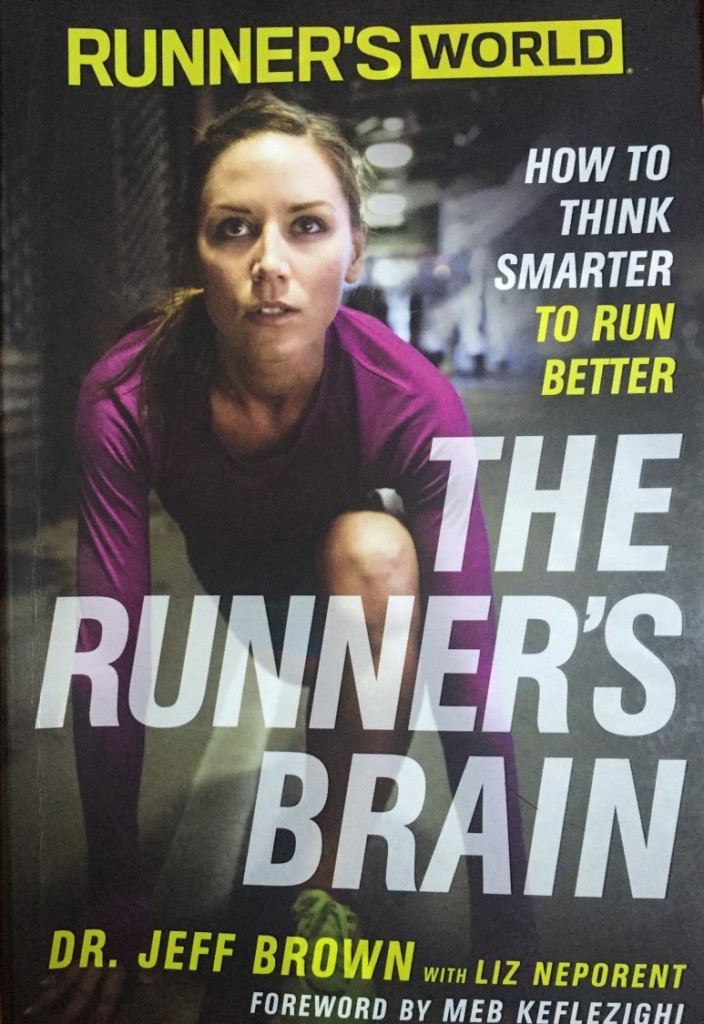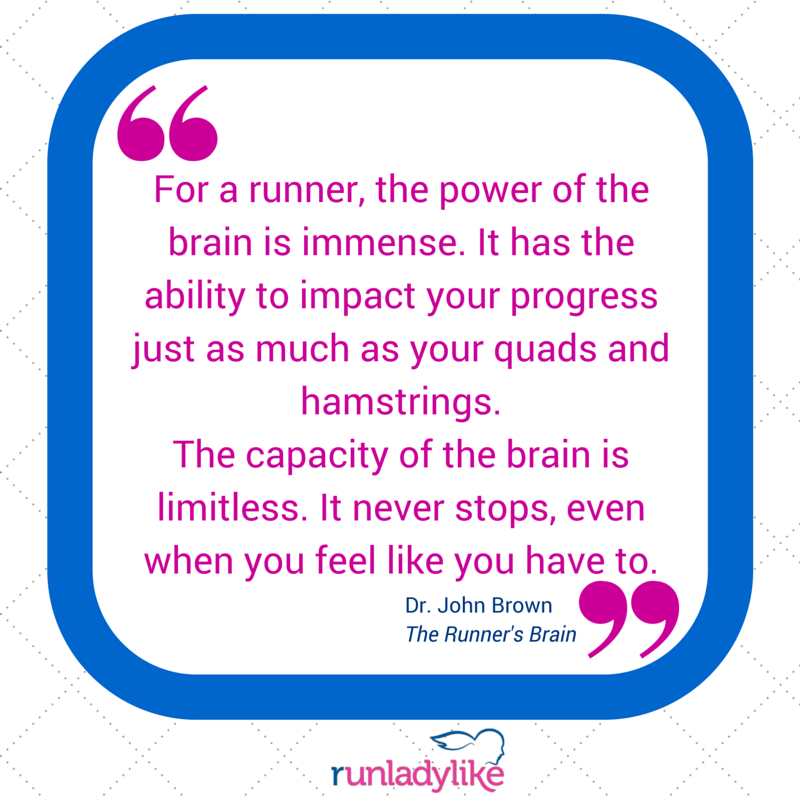The Runner’s Brain
Last week, I was chatting with an acquaintance who told me he was intrigued by NBA players and the mental strength they needed to play the game. All I could think to myself as I smiled and nodded was … if you’re impressed by the mental training and strength of basketball players, wait until you start studying marathon runners.
As runners, we all know that our greatest ally or fiercest foe is our brain. And yet, most of us spend way more time training our muscles than our minds.
“If you’re going to be a runner, you’ve got to have a runner’s brain.”
That’s what Dr. Jeff Brown, the lead psychologist for the Boston Marathon medical team, assistant clinical professor in the department of psychiatry at Harvard Medical School and McLean Hospital and the author of The Runner’s Brain believes. My friends at Rodale sent me a copy of his book before the holidays to review. I devour anything I can get my hands on when it comes to mental strength. I like to think of myself as mentally tough, and yet, I’m often a negative self-taker and self-doubter.

Like anything, ridding our lives and our running of negative self-talk and doubt takes practice and discipline. The Runner’s Brain is definitely a great resource to help.
Here’s what you should know about The Runner’s Brain:
- It’s a quick read with good advice, exercises and tips to put mental training into practical application. For instance, the author doesn’t just tell you how to think, he helps you do mental exercises and everyday activities to start thinking differently.
- The advice and mental training perspective from some of the greatest elite runners of all time at the end of the book are inspiring and powerful. They share thoughts and quotes I found myself wanting to write down and save.
- There are some good tips for how to mentally conquer some of the toughest races in the world.
- I appreciated the practical tips for staying mentally strong in real situations, such as the heat, the treadmill and other everyday running situations that can create boredom or crush confidence.
- The author struggles a bit with trying to ensure the book fits all levels of runners, which means there is some introductory-level language mixed with more sophisticated commentary. It doesn’t always work. I found myself skipping pages about why goals are important and believing you’re really a runner, while newer runners would really benefit from this.
Here are the key takeaways I found particularly helpful:
- Running is good for the brain and the brain is good for running. Running can enhance your brain by sharpening your memory, preventing it from aging and making you happy, even euphoric.
- What you think and feel while you’re not running can have a huge influence on how you perform.

- The Runner’s Brain talks about the importance of goal-setting, but one of the elements it talks about that I really like is the idea of setting a goal that you feel in your gut – making sure your running goals have an emotional attachment to you and that your goal will help you learn about your running and abilities.
- Most experts agree that visualization – imagining yourself in a positive race/running situation – stimulates the same regions and lobes of the brain that are also used in doing. When you can picture your goals clearly being met, you can move closer to actually achieving them. Dr. Brown suggests doing visualization on a daily basis for a few minutes at a time, especially if you are preparing for a big goal or race. He says you should find a quiet place where you won’t be distracted and use ALL your senses during visualization – not just what you see and hear, but what you smell, what you feel, etc.
- To gain more control over your thoughts, notice thought patterns that occur during your daily routine. Add a column in your training journal for what you think about during your training runs and races, and analyze the data to see if you can spot patterns in your thinking and how they correlate with performance.
- Four-square breathing: Dr. Brown suggests a breathing technique to calm ourselves down before big moments and races. Here’s how it works: Picture a square in the air in front of you. When you go down the right side of the square, exhale to the count of four. When you go across the bottom of the square, hold that breath for four seconds. Inhale for a count of four as you go up the left side of the square, and hold again for four across the top. Fill your stomach, not your chest with air and continue to repeat. This would be a great technique to use during yoga as well.
- Fear throws off your pacing, it makes you doubt your strategy and it messes with your sense of energy management. Doubt cracks open the door to failure. Manage your anxiety by thinking confident thoughts.
- As someone who has struggled a lot with running in the heat, I loved Dr. Brown’s words about not waiting for climate perfection: “You can get to your ‘make it work’ moment by adjusting your attitude and hitting your stride no matter what Mother Nature is dishing outside.” He has some great suggestions for running in the heat, such as creating a “cool loop” for your training runs where you run through the shade or stop to drink water in a shady area to give yourself something to look forward to when the weather is beyond hot.
“One of the lessons in running is that there is more disappointment than anything else. I think it’s one of those things that running teaches you. Once you get to a certain level of high achievement, you are much more likely to lose a race than win it. It is a negative until you turn it around and refuse to let it be. You find enough in it to keep motivated and keep hoping for the return of that great day. I learned from the great running coach Jack Daniels that the great day you have is not a fluke. That’s your ability. That’s who you are. You don’t hit it every day, but that is what you are capable of. The goal for me was always to figure out the right formula and get back and have that great day again.” – Amby Burfoot
There are Amazon affiliate links contained within this post.
Have you read The Runner’s Brain? If so, what did you think? What is the best mental training advice you’ve received?



Comments
Thanks for the review! I haven’t read it, but I will definitely check it out. I have a tendency to decide before I even run that my milage or pace is out of reach for me. Practicing some techniques to get away from this would be really helpful.
I can’t remember where I saw this quote, or which elite female runner said it, but it was something along the lines of “You don’t train so it won’t be hard on race day. You train so you know that you can push through it.” It’s stayed with me and I think about it when I’m getting through a tough run.
Hi Katrina! I think we are all guilty of doing that. There are many mornings when I wake up and decide I know my run is going to be crappy … and of course it is because our body often goes where our mind tells it to go. I love that quote. Thanks for sharing. Here’s to a strong mental year in 2016 for all of us. xoxo
Thanks for the review. I have heard a lot about his book and was wondering if it is worth the reading, I will likely look at it. My best mental strategy is when training, to picture myself at the race with all my friends and family cheering me on, and to picture myself getting through a rough spot with a personal coach running right next to me, telling me I can do it. When doing tempo runs and I start to get tired, I also count backwards from 20, it just takes my mind off the pain. Great post!
Hi Angie! I love your strategies to stay mentally strong. In a race I often do something similar where I pretend a woman running next to me is my best friend and training partner. Sometimes I pretend we’re just out on a normal Saturday morning run. I did that during the Chicago Marathon even. I like your strategy for counting backwards. In the book, the author talks about disassociation and association and pros and cons to both. My music often gets me through, which is not always the best strategy, but whatever works, right? xoxo
Thanks for the review Jesica. I have not heard of this book. But will definitely give it a read. Having transitioned from working and training to retirement and training I’ve noticed a big shift in how I am thinking about running and racing.
When I was working, everything was very structured. I spent about 12 hours a day sitting (between the office and Atlanta traffic)
All of a sudden I was spending hours and hours a day on my feet. My legs were in constant pain and it hurt to run. I was dreading going out to run, but I knew I wanted to run because I remembered how much I enjoyed it!
This part of your review struck a chord — “What you think and feel while you’re not running can have a huge influence on how you perform.”
I finally got on some meet-ups and started doing fitness hiking and then back to the gym with cross training, yoga, and recently joined the Fleet Feet running group. Now I’m slowly getting back to adding running back into my routine.
I have noticed how much what you think translates to results. I have started most races with a mental “finish time” in mind and have come out on the other side within minutes of that goal.
All this hasn’t stopped me from lining up my 2016 race schedule. :).
Sarasota 1/2 marathon this weekend, Bear Crawl 10 miler in March and Behind the Rocks 30K in Moab in April.
Thanks again for the review! I’m glad to be back reading your blog.